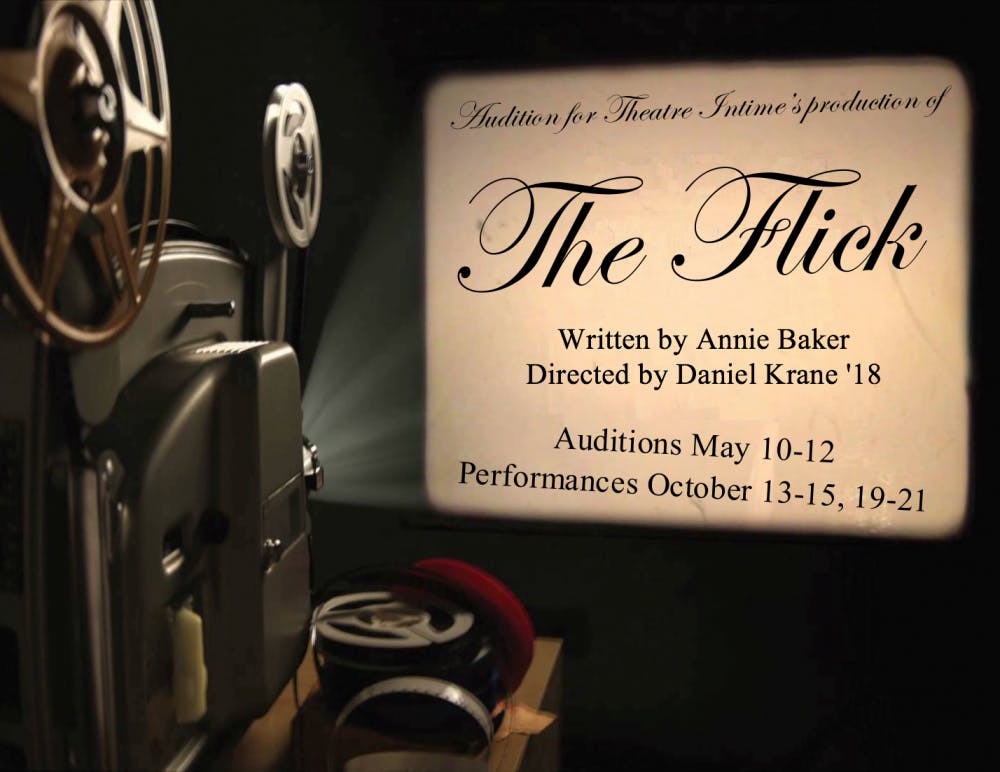Darkness. Silence. Then a single beam of white light as the projector shines on the audience, turning us into film. We wait, seated in two rows on the stage, in anticipation of the actors entrance to the seating area. But first: horns, percussion, swelling music. The movie of us ends and the lights come on in the house of the theater, but the stage remains dark.
“We call this a walkthrough,” was the first line, as Sam (played by Paddy Boroughs ’18) and Avery (played by Jackson Artis ’20) entered the seating area that had become the stage with a broom and dustpan. They commenced one of the countless cleaning routines that made up the majority of the play, which was entirely set in the movie theater where all of the characters work.
What unfolded over the next three and a half hours was a funny, devastating, and at times monotonous work of art: Annie Baker’s Pulitzer Prize-winning play The Flick, brought to life by director Daniel Krane ’18 and the entirely student-run production team and cast.
Criticism of performances of “The Flick” has largely centered around its length; I see validity in both sides of the argument. While the silences as characters swept popcorn felt drawn out at times, they also provided a sort of mental break in the midst of the dialogue. As someone who zones out easily no matter what I’m watching, I found these pauses almost refreshing. I could allow my mind to wander until a character broke the silence, when I never failed to immediately return to the world of “The Flick;” unlike during many lectures, my poor attention span didn’t cause me to miss anything.
The monotony was for the most part, I believe, inevitable. A play of The Flick’s length and set in the same exact location for its duration and with (for the most part) the same three characters, is going to at times feel a little repetitive. There were times towards the end when someone clapped before realizing their mistake, and I’m not going to pretend I didn’t sigh a little in relief when the lights came on, the cast ran back in, and I could stretch my legs again. But perhaps that is also the point. There is nothing romantic about the work these characters have to do for hours each day; it’s tedious, frustrating, sometimes disgusting. Yet somehow the time spent in that movie theater becomes meaningful for each of them in their own way.
I found myself particularly impressed by the blocking of many significant scenes, such as Sam’s confession to Rose (Abby Spare ’20) where he sits a few rows ahead and refuses to look back at her. The actors utilized the space exceptionally well, emphasizing the ease with which people fail to communicate with one another, whether it was Sam and Rose mouthing something behind Avery’s back or Avery trying to find the words to break a tense silence. The setting also allowed the audience to appreciate the rare moments of intimacy between characters, such as when Avery and Rose sit next to each other in the sea of empty seats and she leans her head on his shoulder.
It was the small, quiet moments like these that ultimately made the play for me. They allowed “The Flick” to rise above its source material and become real, the characters human. Although Artis’ take on the famous Ezekiel 25:17 speech was one of my favorite parts of the whole production, Boroughs’ smile in the play’s final moments held more meaning in it than any monologue could.








